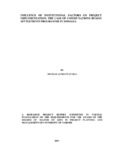| dc.description.abstract | The main goal of review was evaluating institutional factors that impact project implementation for projects implemented by UNHabitat with a key focus on Somalia. Despite the importance of proper planning during implementation and the billions of dollars committed to projects, sometimes project are never completed on time. Unfortunately this has a negative effect because delayed completion of projects results in time overrun, cost overrun, disputes, litigations and sometimes complete abandonment of important projects. Secondly, project recipients are denied of the advantages that would have collected from auspicious finish of project. Review goals was assessing whether institutional policies, procurement procedures, technical competence of the project manager, organizational resources and organizational structures are factors influencing project implementation for projects implemented by UNHabitat in Somalia. Descriptive research design was adopted. The sample population will include Project Managers, Project Assistants and Project Officers. A survey research questionnaire was distributed to 65 respondents from UNHabitat and Implementing Partners presently working in four project sites located in Hargeisa, Mogadishu, Bossaso and Garowe. Data was collected and analyzed and presented through charts and graphs. Data analysis techniques that were used are descriptive statistics while regression analysis was applied to identify a mathematical relation between variables. Review discovered positive relation between project implementation for projects implemented by UNHabitat in Somalia and institutional policies, procurement procedures, technical competence of the project manager, organizational resources and organizational structures. Institutional policies, procurement procedures, technical competence of the project manager, organizational resources and organizational structures were also found to influence implementation of projects implemented by UNHabitat in Somalia to a very great extent. Review established it is essential to manage and direct resources such time, materials and expenses to finish a specific project in an organized and prudent way, in order to meet set up destinations in time, planned sum and to accomplish specialized outcomes It was established from the study that effectiveness of formal and informal communication channels established within the organization significantly influenced the success of the projects. The study recommended that organizations such as the UNHabitat need to enhance their institutional capacity to effectively monitor and evaluate projects to better the chances of success of project. | en_US |



